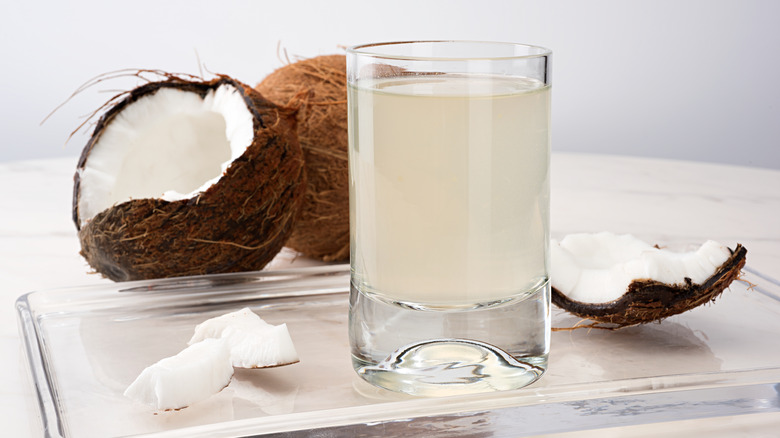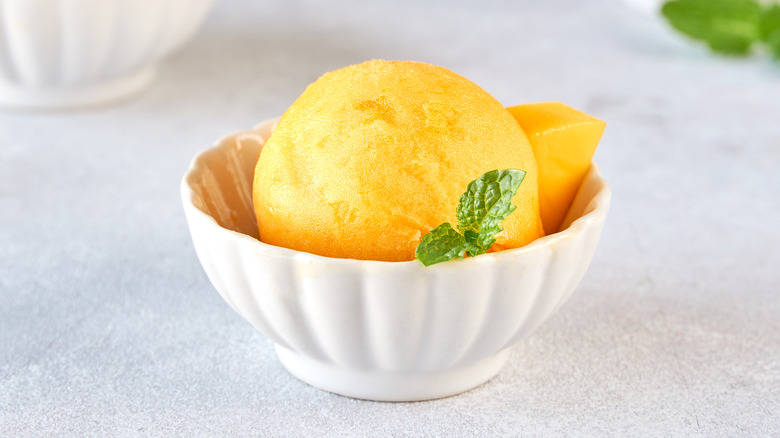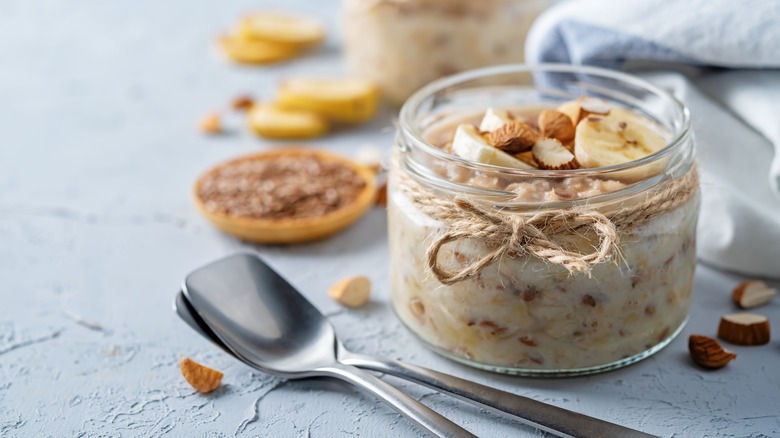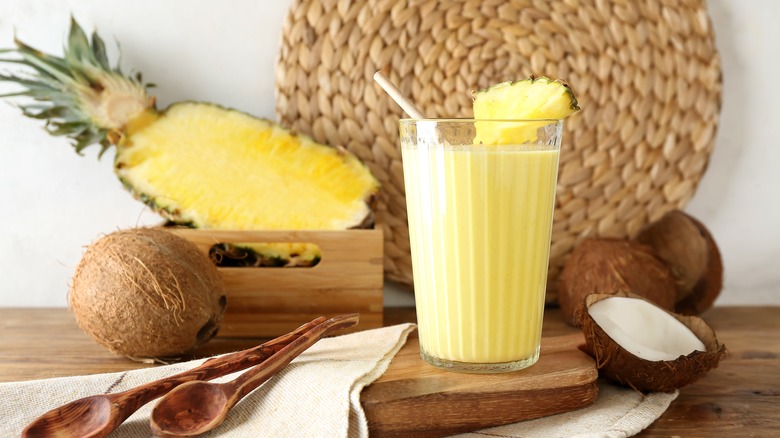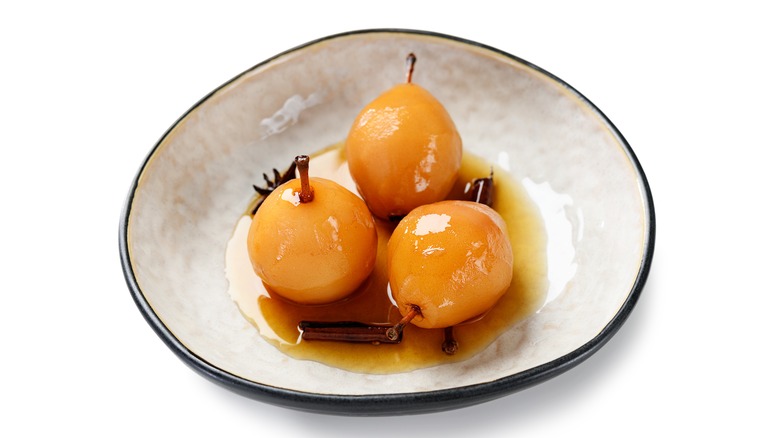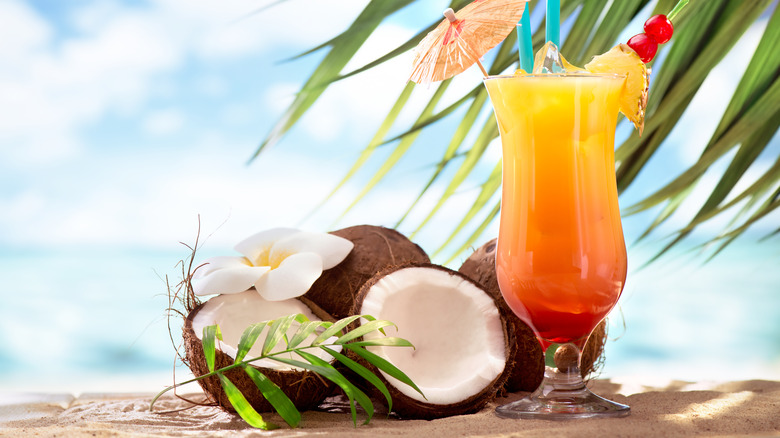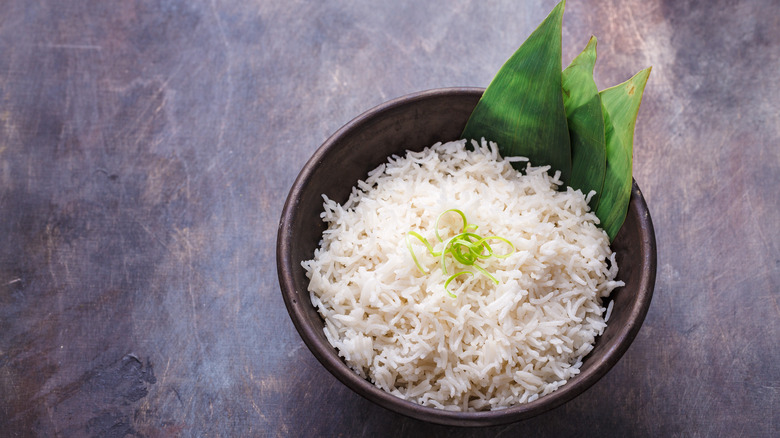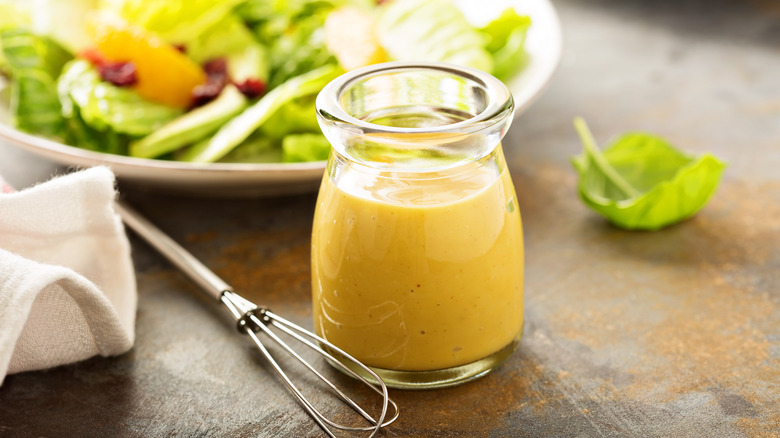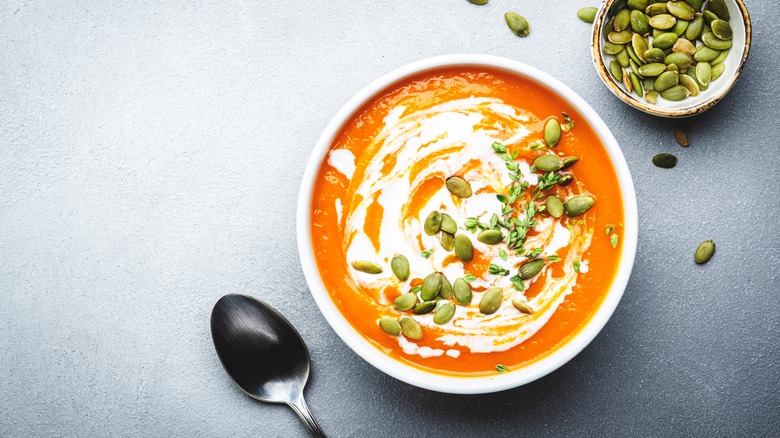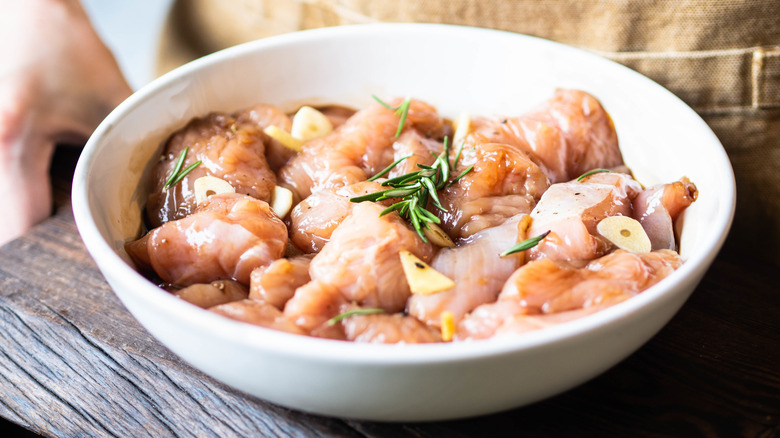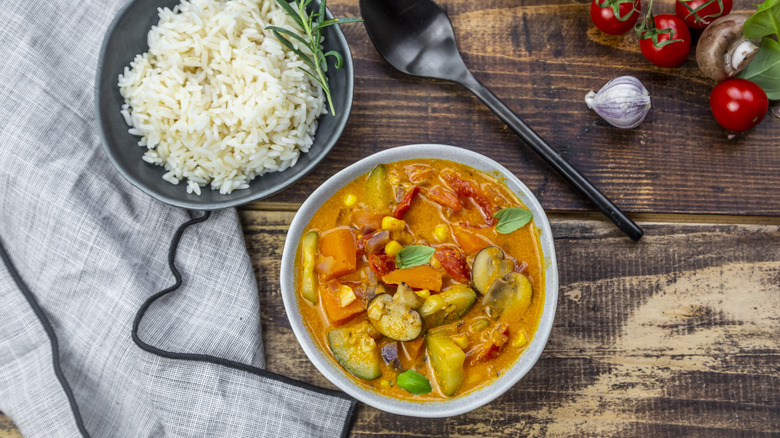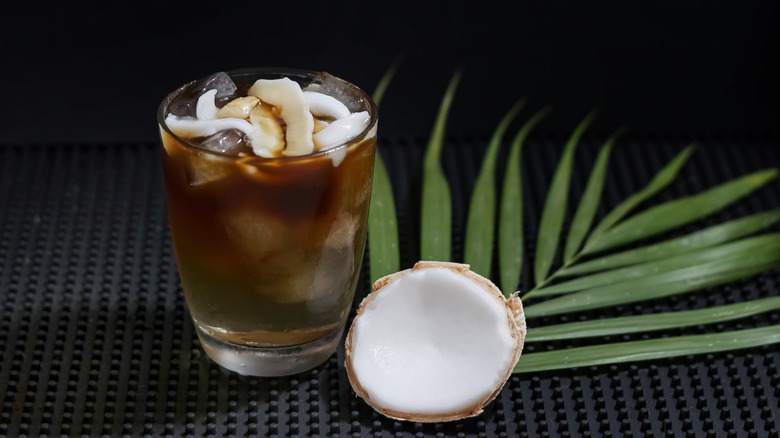13 Creative Ways To Use Coconut Water Beyond Drinking It
Whether you call it coconut juice or coconut water, this beverage has long been touted as a nutritional powerhouse. Loaded with potassium, magnesium, calcium, manganese, and B vitamins, coconut water is considered a great way to hydrate, as long as you are consuming a brand that is produced without a ton of sugar. While drinking coconut water straight out of the can or box is one way to enjoy its many health benefits, it isn't the only way.
Coconut water has a naturally nutty and slightly sweet taste that can be more or less salty and sour, depending upon the brand. This lends itself to many culinary uses that can bolster the nutrition and flavor of a recipe. While some think you can use coconut water anywhere you would use plain water, this isn't always the case. Understanding the inherent flavor-profile can determine if it will accentuate or distract from the other ingredients in a dish.
This is where a trained professional can come in handy. As a chef with nearly 18 years of experience, I have a unique set of skills that allows me to ascertain if a certain ingredient will work well in a dish. When it comes to coconut water, I have a number of creative applications that I have determined are a good fit for its special characteristics. From breakfast to dinner to cocktail hour, read on to discover the many ways coconut water can liven up your favorite dishes.
1. Combine it with fruit for a luscious sorbet
Making sorbet is incredibly easy. It only requires three ingredients, simple syrup, lemon or lime juice, and your fruit of choice, to make a refreshing batch that will surely satisfy any sweet tooth. Simple syrup is just a combination of equal parts water and sugar that have been simmered until the crystals of sugar have dissolved. This is the ideal place to swap plain water with coconut water for a simple syrup that is more than just sweet, but is redolent with nuanced flavors.
To expedite the sorbet-making process, have a batch of simple syrup ready to go. It can be made ahead and stored in an airtight container in the refrigerator for up to a month. For best results, opt for a glass container rather than a plastic or metal one. This will minimize the transfer of unwanted odors and allows you to keep an eye on the syrup for any signs of spoilage.
When making a coconut simple syrup, you may want to infuse it with additional flavors that will enhance sorbets or cocktails. Some of my favorites include extracts, citrus peels, whole spices, fresh or dried herbs, tea, dehydrated edible flowers, and fresh fruit.
2. Level up your overnight oats
Overnight oats are all the rage, and for good reason. They eliminate the need to cook breakfast first thing in the morning, providing you with a quick, healthy meal that will fuel you for the day ahead. While they are simple to make, there is one faux pas that is certain to leave you underwhelmed with your overnight oats: making them with water. Though there are a number of alternative liquids you can use to make this breakfast of champions, coconut water is one that is sure to turn even the biggest oat skeptic into an oatmeal lover.
When using coconut water, swap it one-for-one with whatever liquid is recommended for the recipe you are using. One step that is always crucial when cooking with coconut water is to taste it before you add it to a recipe. Though all brands share some basic characteristics, they do differ somewhat in specific flavor profile, particularly sweetness. This may impact the amount and types of other ingredients you choose to add to your overnight oats.
To enhance the tropical vibe of the coconut water, toss in some fresh pineapple, mango, or bananas. I also recommend adding crunch with toasted, shredded coconut and chopped macadamia, pistachio, or cashew nuts. Lastly, try sweetening your oats with a hint of agave.
3. Amp up the nutrition of your morning smoothies
Smoothies can be a great alternative to a meal or snack when cooking feels like too much of a chore. Unfortunately, some smoothie recipes leave a lot to be desired in the nutrition department. That's where coconut water can come into play. Not only can it help to produce a creamy, frothy smoothie that is satiating, it will add much needed nutrients and hydration when whizzed together with whatever fruits and veggies you are tossing into the mix.
The key is to opt for a coconut water brand that is low in sugar, as most smoothies already contain plenty of simple sugars to give you a quick energy boost. And, don't forget to incorporate some protein and fat into the mix. Without these you are likely to be hungry within an hour of downing your luscious smoothie. Great options for this include nut butters, hemp or chia seeds, protein powders, and low-fat dairy products, like cottage cheese, which is well known for its high protein content.
Lastly, don't forget to lean into flavor when building the perfect smoothie. Flavor enhancers like extracts, cocoa powder, spices, and fresh herbs can help to add complexity without unnecessary sugar or preservatives, ensuring your smoothie is not only healthy, but delicious.
4. Add it to any store-bought cake, brownie, or pancake mix
Store-bought cake, brownie, and pancake mixes exist for a reason. They are quick, easy, and affordable ways of whipping up a treat or breakfast. A majority of them require the addition of just a couple of eggs and some water to create the finished product. That said, some of them leave a lot to be desired in the flavor department. One way to upgrade these store-bought mixes is to replace the plain water with coconut water. The coconut water will add flavor without impacting the overall texture or quality of the final baked good, the way coconut milk can.
Unlike coconut milk, coconut water does not contain fat and is minimally processed, giving it a less viscous mouthfeel and making it less likely to encourage over-browning in baked goods. If you have ever used coconut milk in place of regular milk or water in baked goods, you may have noticed that they have a tendency to burn before the center of the pancakes or brownies are fully set. This will not be an issue with coconut water. Again, opt for coconut water that is low in sugar for best results.
5. Poach fruit for a delectable dessert
Perhaps one of my favorite desserts to make is poached fruit. The process of poaching fruit allows it to soften while amplifying its inherent sweetness and infusing it with flavor. It makes for a light, yet elegant, dessert that is the perfect capstone for a gourmet meal. When poaching fruit, there are two crucial elements to consider, the ripeness of the fruit and the construction of the poaching liquid. The latter is where coconut water can play an integral role.
Though you can poach fruit in plain water that has been fortified with sugar and various seasonings — ranging from extracts and herbs to spices and citrus zests — combining various poaching liquids adds complexity and nuance that is a game changer. I like to factor in elements like flavor, aroma, and color when deciding on poaching liquids. While coconut water is clear, it does have a distinct aroma and taste that lends nuttiness and sweetness to the mix. This can easily be augmented with other liquids, like orange or pineapple juice, a sweet white or sparkling wine, and a fruity white tea, for a tropical-inspired poaching liquid that has a distinct, visually appealing, amber hue.
6. Create cocktails with tropical flair
An obvious place to incorporate coconut water is in making cocktails, as it is a great alternative to soda, seltzer, or tonic water. It also allows for any alcohol to be diluted without adversely impacting the mouthfeel of a beverage.
For a caffeinated cocktail with a more complex flavor, coconut water is used to brew coffee or tea. When it comes to drinks that typically rely on heavier coconut cream or milk, coconut water can be swapped to produce a skinny alternative, though it will alter the texture of the beverage somewhat. Coconut water is also a stellar addition to a fruity sangria, where it can help tame the acidity of the wine and lend a hint of sweetness. Lastly, as previously noted, it is the perfect alternative to water for making a tasty twist on a simple syrup, which is a key ingredient in many cocktails.
When supplementing unsweetened ingredients with coconut water, keep in mind that you may need to adjust a cocktail recipe accordingly to accommodate the inherent sweetness of this beverage. If you notice a cocktail made with coconut water is still excessively sweet, try adding a hint of acidity to balance out the flavors.
7. Cook rice in it
While water may be the go-to liquid of choice for cooking rice in most recipes, it is also the most boring option. Rice is essentially like a sponge; the water in which it cooks is absorbed, plumping up the rice kernels and infusing them with what little flavor, color, and texture there is to soak up. One way to revolutionize your rice game is to swap that tiresome water with another type of liquid. Though there are many to choose from, coconut water is a great option because it can amplify its inherent nuttiness and add elements of sweetness, without directly impacting the texture of the rice kernels.
Coconut rice is not without precedent. It is a common dish prepared across Southeast Asia and in parts of the Caribbean. Many of these recipes rely on coconut milk for flavor and a creamy texture. While this is delicious in its own right, it can be quite rich, making it a less suitable side for saucy dishes. When I want the flavor notes of coconut without the added fat, I turn to coconut water to do the trick. This yields a lighter-textured rice that is ideal for sopping up the juices from a luxurious, spicy curry or any saucy protein dish.
8. Freeze it into ice cubes
Whether you are seeking to chill a glass of water, soda, juice, or a sassy, rum-filled cocktail, you are going to need ice cubes to perform this task. Though plain ice cubes are certainly serviceable, as they melt, they will water down your beverage, diluting its flavor and making it taste bland. A great alternative to plain ice cubes is to transform that can or box of coconut water into them. It's as easy as pouring the coconut water into ice cube trays and freezing them. The cubes can be transferred to freezer bags for use in any of your favorite beverages or as a component in your favorite smoothie recipes. The resulting coconut water ice cubes will infuse your next rum and coke with added flavor as they melt, rather than making it taste dull.
For even more flavorful and beautiful ice cubes, try adding fruit or fresh herbs to your coconut water before it freezes. Pop a fresh raspberry, mint sprig, or piece of orange peel into each section of your ice cube tray before filling it with coconut water. Once frozen, each cube will be punctuated by the color and flavor of the added ingredient, enhancing the taste of your beverage even more as the cube melts.
9. Dress your next salad with it
As a chef, I am quite discerning when it comes to salad dressings. Though I understand the appeal of store-bought dressing, many of these are laden with excess fat, preservatives, and additives that overwhelm greens and offset the nutritional benefit of eating a vegetable-rich salad. I much prefer to make my own vinaigrette using extra virgin olive oil, a dash of high-quality vinegar, dijon mustard, a hint of honey or maple syrup, and a splash of white wine. When I want an alternative to the wine that is non-alcoholic, yet will still impart a distinctive flavor, I turn to coconut water.
Coconut water works so well because its inherent nutty and slightly sweet flavor are the perfect counterbalance to the acidic vinegar and the tangy dijon mustard. It also plays well off of bitter greens and pungent cheeses, while helping to highlight similar tasting components, like candied nuts and macerated fruit. And, while it may seem tempting to use coconut milk to produce a creamier dressing, I advise against it, as the added fat can cause your dressing to seize, making it difficult to toss a salad. Coconut water will not adversely impact the texture of your dressing, while providing a similar flavor profile.
10. Enrich a soup recipe
Another dish that I consider a specialty of mine is making homemade soup from scratch. I find the process of making soup as comforting as eating it. Though the components of soup matter, from the mirepoix to the type of fat you use, what these cook in is perhaps the most important part of the equation. Homemade stock or broth is always a great option, but sometimes I crave something with a little more complexity. That's when I enjoy enriching a batch of soup with some coconut water. The water can be used to substitute some or all of the cooking liquid or it can be added toward the end of cooking to help purée the soup into a creamy bisque.
Though you can use coconut water in virtually any soup recipe, certain soups will be more well-suited to its particular flavor profile than others. Those with Asian or Caribbean-inspired flavors are a natural fit, as are those that rely on sweeter components, like various types of winter squash, carrots, or sweet potatoes. One place you may not anticipate coconut water performing well is in a meaty soup, like Albondigas or an Italian Wedding Soup. That said, the nutty and sweet elements within the coconut water can really accentuate the umami-notes of pork, beef, or chicken, helping bring them to the forefront of the dish and melding them with the vegetables more seamlessly.
11. Mix it into a marinade for meat or vegetables
Contrary to popular belief, marinades are not necessarily only useful for tenderizing tough cuts of meat; in fact, some chefs will argue that they don't tenderize them at all. What they actually do is denature the proteins within the meat, which in essence is what cooking does, and if allowed to marinate too long in an acidic marinade, the protein can actually become mushy, rather than tender. The more important function of a marinade is to infuse meat with flavor, which is why a well-balanced recipe complete with sweet, sour, salty, bitter, and umami-rich notes is key. For this reason it is important to incorporate plenty of aromatics, herbs, and spices to the liquid components, which are usually composed of an oil and an acid.
If you are seeking to infuse meat with flavor while minimizing the amount of acid present in the marinade that might denature those proteins, try swapping some of the liquid in the mix with coconut water. Again, those nutty and sweet flavor notes will help offset the acidity while providing ample liquid to completely submerge the cut of meat, allowing the marinade to permeate every nook and cranny. Perhaps my favorite meats to marinate with coconut water are chicken, pork, and fish. These are subtle enough in flavor that they can really absorb the delicate coconut, allowing it to shine through after the meat has been grilled, roasted, or pan-seared.
12. Elevate a vegan curry
The term curry refers to saucy dishes that are found across Southeast Asia and beyond. Curries can be made from meat or vegetables that are combined with aromatics, herbs, and spices stewed until rich and unctuous. These are generally served with fluffy white rice, which is the ideal accompaniment to soak up these pungent, sometimes spicy, saucy dishes. Many recipes are made using coconut milk, which lends a creaminess and helps to temper the heat from spicier elements, like chili peppers. That said, I sometimes find that using coconut milk alone can be a little too rich for my taste, which is why I like to supplement it with coconut water when making a delectable curry.
Because the coconut water has a similar flavor profile to coconut milk, it performs the same function without the added fat, making the curry a bit less heavy and giving the sauce a slightly more delicate mouthfeel. I find it performs particularly well in vegetarian curries, like this umami-rich mushroom recipe, because it doesn't overwhelm the vegetables or mute their natural flavor.
13. Transform your morning coffee ritual
While I have already alluded to this in my discussion of how coconut water can be used in making cocktails, it is worth revisiting because this is an ingredient that could completely revolutionize your morning coffee ritual. Though I suspect some coffee purists will balk at the notion of brewing their favorite cup of Joe in coconut water, doing so can produce a hydrating and complex flavored cuppa that will be enhanced with natural nuttiness and sweetness that can help you reduce some of that added cream and sugar.
Coconut water can be used to make a hot or cold brew by substituting some or all of the plain water you would typically use. If you are concerned with the coconut water muting the inherent flavor of the coffee bean, I recommend opting for a dark roast coffee that has a bolder flavor. I also suggest opting for coconut water that is lower in sugar. And, don't forget to reserve leftover coconut water coffee for use in chocolate desserts, like cookies and brownies, where the brew can help to accentuate the cocoa aroma and taste.
